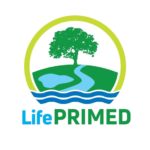LIFE PRIMED
Restoration, management and valorisation of priority habitats of Mediterranean coastal areas
LIFE PRIMED is focused on the rewilding and restoration of the Palo Laziale wood in central Italy, and the delta of the Nestos River in Greece – both of these are Natura 2000 sites. It aims to identify the reasons behind the current unfavourable conservation status of the two sites, and to work to restore degraded ecosystems.
Over the last 20 years Palo Laziale has experienced rapid forest decline and dieback. The final stage of the tree dying process is characterised by a fungal infection, which is triggered by conditions such as drought, increased temperature due to climate change, increased salinity and a lack of forest management. In Nestos, the degradation is due to drought linked to climate change, illegal logging, fragmentation, overgrazing and trampling.
The project’s proposed forestry and hydraulic interventions – which include drainage trenches, underground tanks and gravity-powered water distribution network – represent the best solution to deal with drought and will have a substantial impact on the entire floodplain forest and temporary pond ecosystem. The solutions developed as part of the project will then be used in other environmental contexts to enable the long-term conservation of habitats along the Mediterranean coast.
LIFE PRIMED is focused on the rewilding and restoration of the Palo Laziale wood in central Italy, and the delta of the Nestos River in Greece – both of these are Natura 2000 sites. It aims to identify the reasons behind the current unfavourable conservation status of the two sites, and to work to restore degraded ecosystems.
Over the last 20 years Palo Laziale has experienced rapid forest decline and dieback. The final stage of the tree dying process is characterised by a fungal infection, which is triggered by conditions such as drought, increased temperature due to climate change, increased salinity and a lack of forest management. In Nestos, the degradation is due to drought linked to climate change, illegal logging, fragmentation, overgrazing and trampling.
The project’s proposed forestry and hydraulic interventions – which include drainage trenches, underground tanks and gravity-powered water distribution network – represent the best solution to deal with drought and will have a substantial impact on the entire floodplain forest and temporary pond ecosystem. The solutions developed as part of the project will then be used in other environmental contexts to enable the long-term conservation of habitats along the Mediterranean coast.

